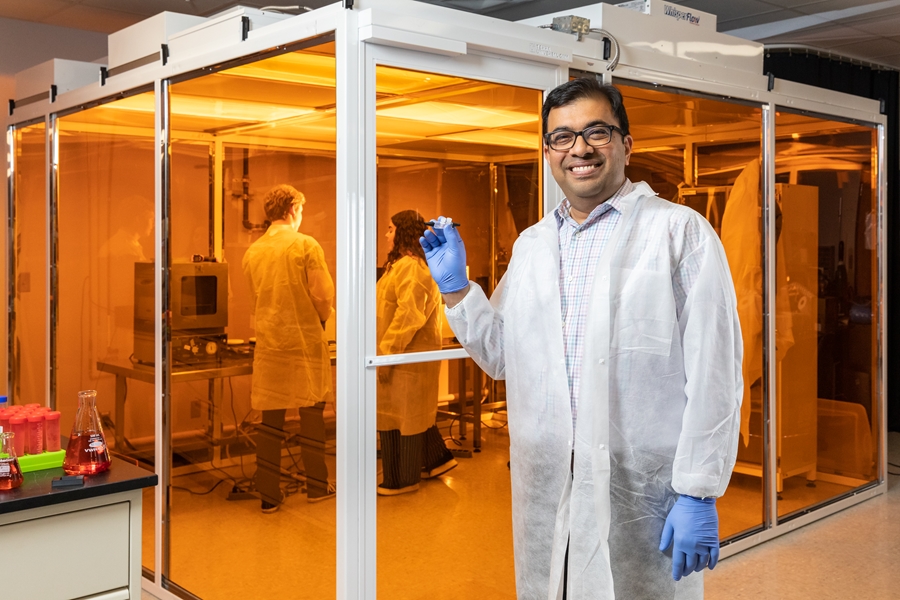Nanomatronix, a local startup company that develops nanotechnology, microelectronics and biotechnology to provide solutions for the healthcare, energy and defense industries, has been awarded a $1.1 million Small Business Innovation and Research Phase II Award from the Department of Defense. This award builds on a previous award from the department.
The purpose of the award is to continue development of the Advanced Microphysiological Brain Injury Technology (or AMBIT) Platform. This is an organ-on-chip model that utilizes human, cell-based tissues to replicate brain injury pathophysiologies. The chip will enable researchers to model the transport of molecules across the blood-brain barrier before and after traumatic brain injury and examine the communication between different cell types, providing a useful tool for drug screening and toxicity studies.
Kartik Balachandran, associate professor of biomedical engineering at the U of A, has been overseeing the research and development of the AMBIT Platform and has received a sub-award of $550,000.
“We’re excited for the opportunity to further develop our AMBIT Platform towards commercialization and also expand our customer base,” Balachandran said.
“Nanomatronix is excited to collaborate with Dr. Kartik Balachandran to bring AMBIT to market,” said Angeline Rodriguez, a biomedical engineer who will oversee the grant at Nanomatronix. “The goal of this Phase II project is completion of a viable product and service. Additional evolutionary product improvements are being identified, currently, through the NSF STTR Program. In approximately two to two and a half years, the first full AMBIT product will be ready for launch, and the first batch of products will be delivered to customers.”
Rodriguez added that what made AMBIT unique was that previously developed brain-chips do not have the ability to mechanically mimic traumatic brain injury in their design.
“AMBIT is able to provide a TBI-like mechanical insult to study its effects on the blood-brain barrier,” Rodriguez said. “This platform is relevant for drug discovery and testing in the context of TBI-mediated pathologies and other neurotrauma sequelae. AMBIT is designed using iPSC-derived cells, so it will play an important role in precision medicine because the cellular components can be derived from patient-specific, clinical-grade cells.”
Rodriguez noted that organ-on-chip technology was revolutionizing the study of diseases, and that Balachandran’s work presented a unique business opportunity to explore technology that can be used to evaluate brain injury pathophysiology.
The federal Small Business Innovation and Research award program incentivizes small businesses to pursue research and development with the potential for commercialization. The goal is for businesses to reach their technological potential and to create a pathway to profitability through commercialization.
Those interested in Balachandran’s organ-on-chip research, which can replicate a range of organs, can find a fuller treatment on the U of A’s Determined website.
About the University of Arkansas: As Arkansas' flagship institution, the U of A provides an internationally competitive education in more than 200 academic programs. Founded in 1871, the U of A contributes more than $2.2 billion to Arkansas’ economy through the teaching of new knowledge and skills, entrepreneurship and job development, discovery through research and creative activity while also providing training for professional disciplines. The Carnegie Foundation classifies the U of A among the few U.S. colleges and universities with the highest level of research activity. U.S. News & World Report ranks the U of A among the top public universities in the nation. See how the U of A works to build a better world at Arkansas Research News.
Topics
Contacts
Angeline Rodriguez, biomedical engineer
Nanomatronix LLC
479-215-9438,
Hardin Young, assistant director of research communications
University Relations
479-575-6850,
